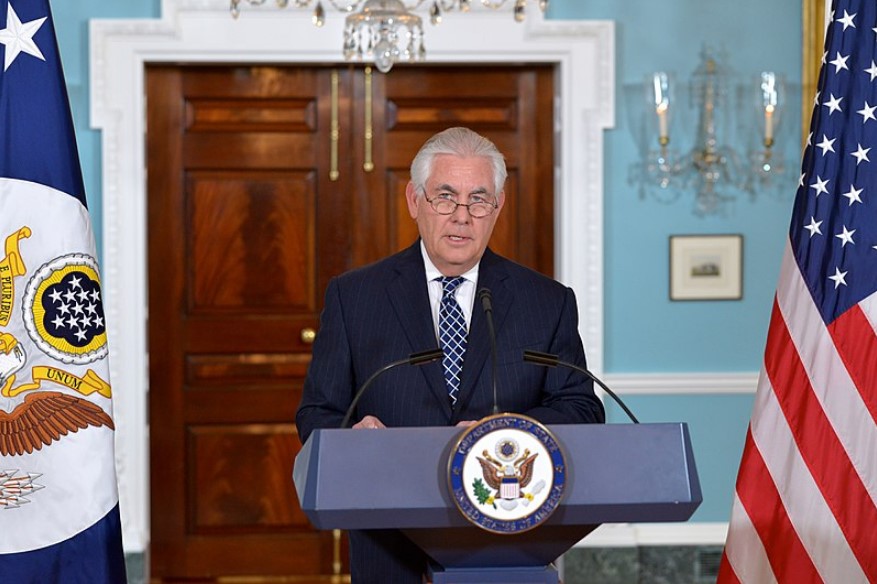
A new study of in-house research by ExxonMobil has revealed that the oil giant had detailed and accurate predictions of the impact of fossil fuels on global warming as early as the 1970s. And yet, the company continued to downplay and cast doubt on man-made climate until as recently as the last decade. The lies and deceptions of fossil fuel magnates will surprise no one, but this study reveals the true depths of cynicism that the capitalist class are capable of plumbing in defence of the crimes they commit for profit.
Published this month, Assessing ExxonMobil’s global warming projections analyzed 32 internal reports and 72 scientific publications produced by scientists working on climate and environmental models at ExxonMobil between 1977 and 2002.
Their findings were astoundingly accurate. They projected a warming of 0.2C per decade; they dismissed the idea of an ice age in the near future; they gave an accurate approximation of the amount of CO2 needed to cause a dangerous increase in temperatures; and they correctly estimated that global warming would be detectable between 1995 and 2005.
Had these models been brought to light at the time, they would have been consistent with the most cutting-edge research of the period. In fact, according to Professor Geoffrey Supran, co-author of the article, Exxonmobil’s climate researchers were “at least comparable in performance to one of the most influential and well-regarded climate scientists of modern history.”
Supran noted the “shocking accuracy and skill” of the research conducted at ExxonMobil, with 83 per cent of the estimates made by the company’s climate scientists having since been shown to be accurate.
‘Emphazise uncertainty’
Naturally, the ultra-rich owners of the oil giant were less than keen on sharing these findings with the public. In fact, for almost four decades after this research, ExxonMobil’s public communications put out messages that directly contradicted their own evidence.

Source: U.S. Department of State
In 1999, Lee Raymond (then CEO of ExxonMobil) stated that climate “projections are based on completely unproven climate models, or, more often, sheer speculation.” Raymond is of course no stranger to speculation—albeit of a financial kind—having received a large portion of his $400 million retirement plan from the company in stock options, the largest retirement package in history for a US public company.
Rex Tillerson—who took up the mantle of CEO in 2006 before becoming U.S. Secretary of State under Donald Trump—continued ExxonMobil’s tradition of denying the value of climate research. In 2013, Tillerson stated that climate models are “not competent” and in 2015 claimed: “We do not really know what the climate effects of 600 ppm versus 450 ppm will be because the models simply are not that good”.
This latter statement was directly contradicted by the company’s own researchers over thirty years earlier. In a 1982 projection it was found that 600 parts per million of CO2 in the atmosphere would cause an additional warming of 1.3°C compared to 450 ppm.
Yet ExxonMobil’s climate coverup was not restricted to a few bad apples who just happened to have risen to the post of CEO. A 1988 internal memo on the company’s public affairs strategy stated that there was a need to “emphasize the uncertainty in scientific conclusions regarding the potential enhanced greenhouse effect”.
Later internal memos demanded that the company “stress environmentally sound adaptive efforts” and in 1998 it was suggested that “victory will be achieved when average citizens ‘understand’ (recognize) uncertainties in climate science.” This is not a “victory” for the environment or for the working class, of course, but a victory for the bosses, victoriously pulling the wool over the eyes of the public in order to lead them like lambs to the slaughter.
As late as 2000, downplaying climate change was an integral part of ExxonMobil’s marketing strategy. An advert published in The New York Times stated that climate science suffers from “fundamental gaps in knowledge” and claimed that not enough is known about the “potential positive… impacts of climate change”. This was despite overwhelming certainty both in public and among ExxonMobil’s own researchers that the opposite was the case.
Criticism or class struggle?
This study has revealed breathtaking cynicism and barefaced hypocrisy by the likes of ExxonMobil. But in reality this is no aberration. Indeed, it is quite logical for the capitalist class to hide the facts when the facts get in the way of making a good profit. The tobacco companies hid the truth about how smoking causes lung cancer. In the 1960s, the sugar industry hid the truth about sugar’s role in causing heart disease. No doubt thousands, and perhaps millions, died as a result. The consequences of climate change threaten to be orders of magnitude more terrible.
The article lists numerous U.S. and E.U. hearings, divestment campaigns, lawsuits and hashtags, as well as Joe Biden’s “repeated commitments to hold fossil fuel companies accountable” as examples of how political movements have responded to oil companies’ disinformation campaigns. Yet none of the pressure from pressure groups, nor the hot air from politicians that work hand-in-glove with the oil and gas giants, have stopped the latter from merrily coining our planet’s future into shareholder dividends.
Only recently, Exxonmobil showed how it can dictate to governments by suing the European Union over its plan to introduce a windfall tax on energy companies. The company also threatened to halt “multibillion Euro” investments in Europe, unless the E.U. became “attractive and globally competitive”—that is, unless governments give them free reign to profiteer.
If we want to tackle the pernicious role of energy corporations in fueling climate change, if we want to punish them and bring them to justice for their crimes, then moral condemnation is insufficient. Climate change will not be solved by making oil bosses “tell the truth”, nor by hoping that capitalist politicians will climb out of bed with them and take our side. The way will begin to be laid for a solution, and we will begin to deliver real justice, when we expropriate these energy giants and place the democratic management of energy production under the control of the working class as part of a planned economy.

